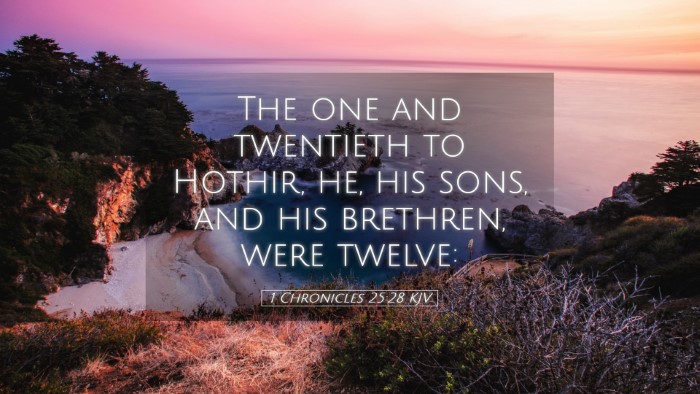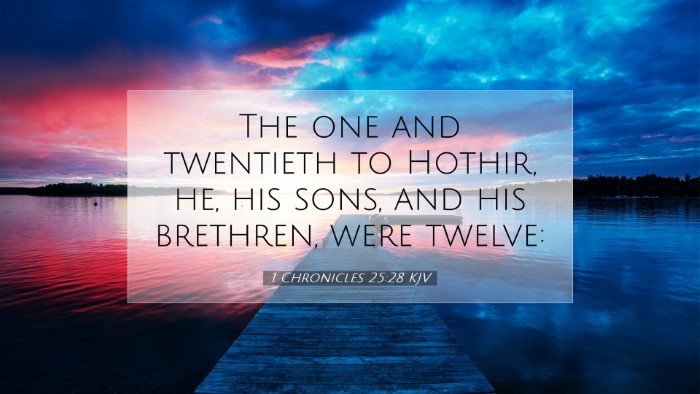Commentary on 1 Chronicles 25:28
Verse Context: 1 Chronicles 25:28 states, "The number of these men, who were trained for service, was two hundred and eighty-eight in all." This verse is part of the larger passage concerning the organization of David’s temple musicians. It emphasizes the importance of structured worship and the roles assigned to those who minister in the house of the Lord.
Interpretative Insights
The organization outlined in this chapter reflects David's commitment to establishing proper worship and the significance of musical ministry in Israel. The chosen number, 288, is not arbitrary but highlights God's provision and order in the worshiping community.
Historical Context
This chapter provides an overview of the roles and responsibilities of the Levites, particularly regarding their musical duties. Matthew Henry points out that this order was essential in keeping the worship of God in the tabernacle pure and reverent. The role of music in worship can be traced back to the Exodus and the songs of Moses, which set a precedent for the Israelites' praise.
Theological Significance
From a theological perspective, the organization of musicians reveals the nature of God’s presence among His people. Albert Barnes notes that God is a God of order and that the careful appointment of worship leaders reflects divine intention. Each musician had a specific role to enhance the community's worship experience, emphasizing that every member of the worshiping community plays a vital part in the glorification of God.
Application for Worship Today
This passage transcends its historical context and calls contemporary worship leaders and congregants alike to consider their roles. Adam Clarke emphasizes that just as in ancient Israel, the church today needs dedicated servants who are set apart for the ministry of music and worship. The inclusion of trained musicians indicates the value of skill and devotion in worship, encouraging modern musicians to pursue excellence for the glory of God.
Detailed Commentary From Notable Theologians
-
Matthew Henry:
Henry reflects on the indicated number of musicians as not only from the Levite tribe but also as a fulfillment of God’s commandments regarding worship. He highlights that this organization serves as a model for Christian communities in structuring worship services effectively, demonstrating the beauty of an orderly approach to glorifying God.
-
Albert Barnes:
Barnes discusses the significance of the specific number of musicians, suggesting it illustrates God’s provision for worship in Israel. The organized efforts of worship leaders in music symbolize the worshiping community's unity in purpose and the importance of role allocation within the body of Christ today.
-
Adam Clarke:
Clarke emphasizes the need for training and preparation among worship leaders, noting that effective ministry must involve both spiritual and practical readiness. He views the careful structure of musical roles as indicative of God’s emphasis on quality and discipline in worship, urging modern-day worship teams to invest in their God-given talents.
Conclusion
The passage in 1 Chronicles 25:28 serves as a vital reminder to the church of the importance of worship organization and the roles individuals play within that structure. By examining the insights of Matthew Henry, Albert Barnes, and Adam Clarke, believers can deepen their understanding of the sacred duty of music in worship. The dedication and training of these musicians speak to the heart of honoring God through beauty and excellence in our worship today. This serves as an ongoing call for church leaders and musicians to rejoice in their calling while seeking the Holy Spirit's guidance in their service.


